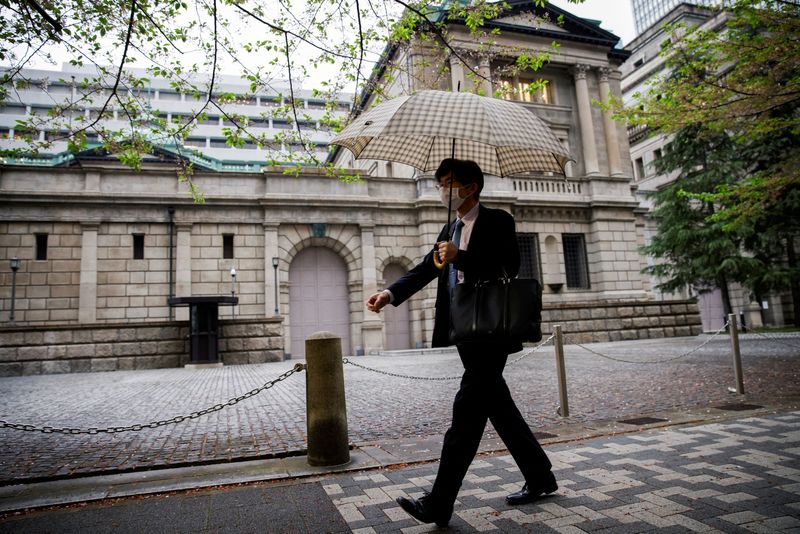
© Reuters. FILE PHOTO: An office employee walks in front of the bank of Japan building in Tokyo, Japan, April 7, 2023. REUTERS/Androniki Christodoulou/File Photo
By Leika Kihara
TOKYO (Reuters) – The Bank of Japan may revise up this year’s inflation forecast but will likely hold off on tweaking its yield curve control (YCC) policy in July to await more evidence that wages will keep rising, its former top economist Seisaku Kameda told Reuters.
The BOJ will release new quarterly forecasts at its next meeting on July 27-28, which will include estimates for core consumer inflation excluding the effect of fresh food, and so-called “core-core” inflation that also strips away fuel costs.
Given the distortions caused by volatile fuel prices, the core-core inflation forecasts are better indicators of how the BOJ views inflation trends, Kameda said.
With cost-push inflation lasting longer than expected and service prices creeping up, the BOJ will likely revise up its core-core inflation forecast for the current fiscal year ending in March 2024 from the 2.5% projection made in April, he said.
But the bank will likely keep its forecasts for 2024 and 2025 roughly unchanged in a sign it is not yet convinced that the 2% target for inflation will be achieved on a sustainable basis, said Kameda, who has deep knowledge on how the BOJ produces economic forecasts.
“We’re seeing positive signs in inflation and wages,” Kameda said on Friday. “But I’m not sure whether they are enough to make the BOJ suddenly turn hawkish on policy.”
Under current projections made in April, the BOJ expects core-core inflation to hit 1.7% in fiscal 2024 and 1.8% in 2025.
While a July policy shift is unlikely, the BOJ could tweak yield curve control later this year if it sees clearer signs a demand-driven inflation, accompanied by wage gains, will take hold, said Kameda, who now serves as an economist at a think tank affiliated with Japan’s Sompo holdings.
Predicting the timing of a policy tweak would be much about interpreting the subtle change in tone of Ueda’s remarks on how convinced the BOJ is becoming about achieving its price target, he said.
“Sustainably achieving 2% inflation in Japan is tough, so it’s natural for the BOJ to be frank about the uncertainty of success,” he said. “But it means its policy signals could be quite ambigious.”
With inflation exceeding 2% for more than a year, markets are simmering with speculation the BOJ will tweak YCC – a policy that guides short-term rates at -0.1% and the 10-year bond yield around 0%.
Source: Investing.com





























